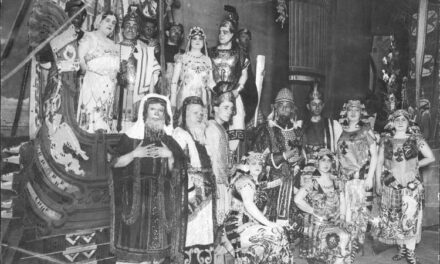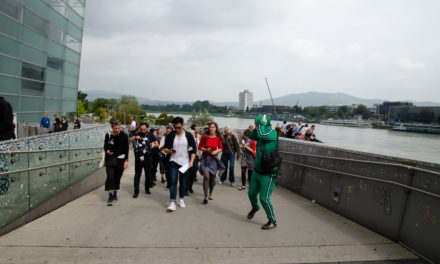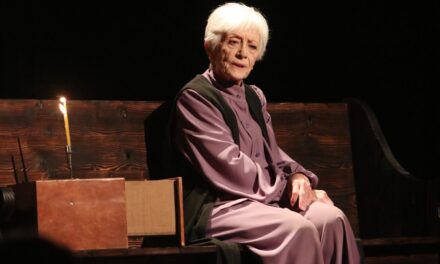For the first part of this article go here.
No coherent government program has been put in place to help artists during the pandemic. Most of them, especially freelancers, are not covered by any of the government’s successive anti-crisis packages. Freelancers, due to the type of contracts they have or the fact that they have nothing but verbal agreements, cannot apply for shutdown money or any other compensation. The only form of relief provided from the Culture Promotion Fund of the Polish Ministry of Culture and National Heritage, a grant of PLN 1,800 (1 PLN is c. 0,25 USD or 0,22 EUR), was first introduced as a one-off payment and then changed into a benefit that one can apply for more than once. However, the number of applications has been so huge that many artists are still waiting for the money or for approval. The Ministry also announced a program called Online Culture [Kultura w sieci], which delivered assistance to hundreds of initiatives, but thousands of applications have been rejected. Applicants were required to engage in artistic activities and share them online for free. For example, the Ministry supported the Modjeska Theater in Legnica to produce the online premiere of New Decameron and Wałbrzych’s Dramatyczny Theater to fund its Szaniawski.FM project.
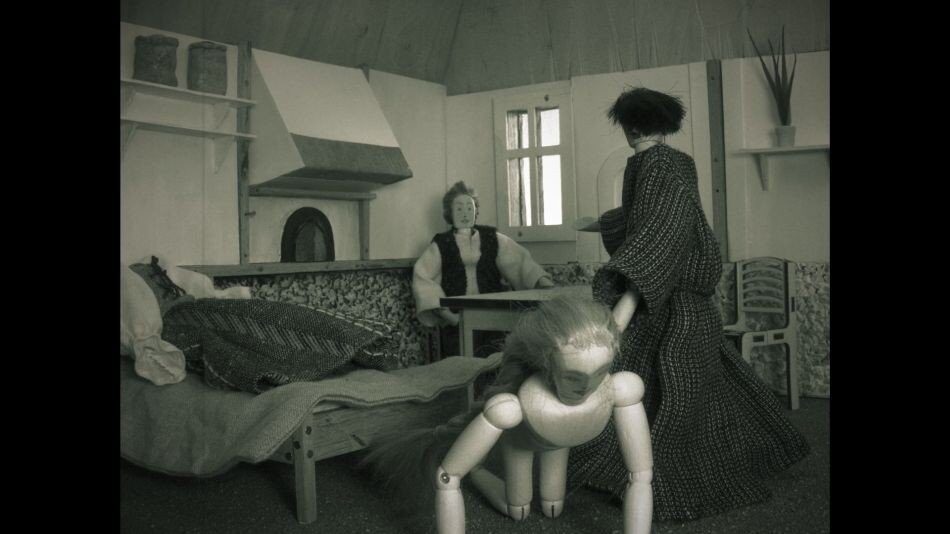
Nowy Dekameron [The New Decameron] by the Modjeska Theatre in Legnica. Copyrights: Modjeska Theatre.
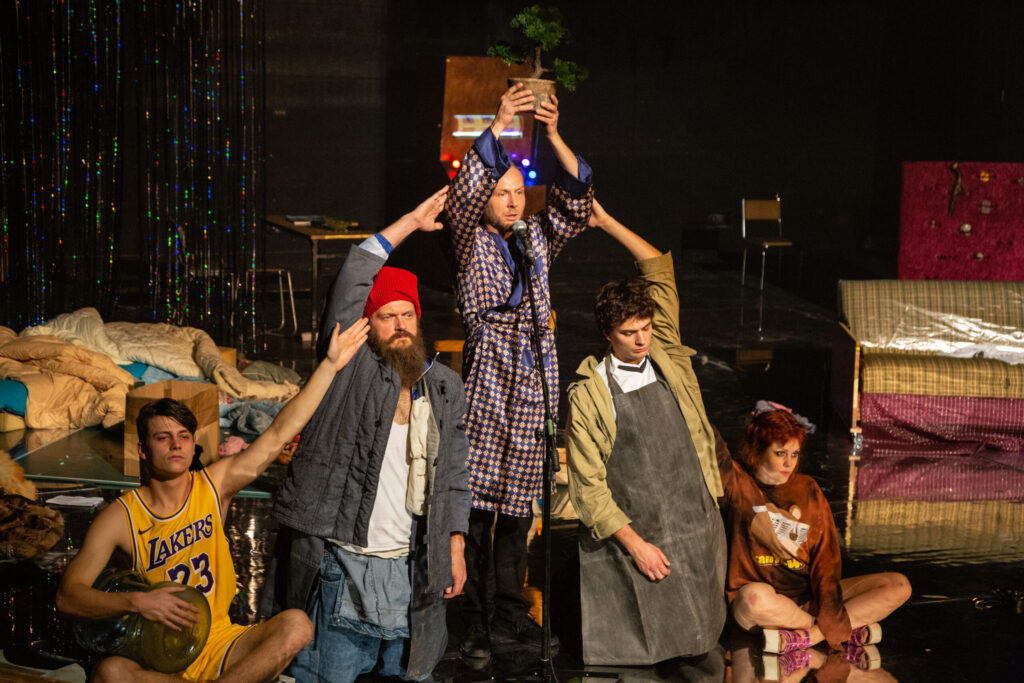
Dziewczynka z za/ przyszłość boli tylko raz [The Girl From Outside / Future Is Painful Only Once by Mariusz Zaniewski. Live Streamed from the Nowy Theater in Poznań. Photo by Wiktor Napierała.
A number of smaller-scale events, recitals and concerts are planned for June at the Capitol Music Theater in Wrocław ‒ full-cast shows would be lethal for the theatre’s budget, which has been heavily hit by the pandemic. The opening of Agnieszka Wolny-Hamkało and Martyna Majewska’s Alice, originally planned for June, has been rescheduled to early 2021, also for budgetary reasons. Actors will start their holiday vacation break earlier than usual, on June 22, to be able to return in early August to start rehearsals for David Bowie’s Lazarus helmed by Jan Klata, which will open earlier than planned, on September 26. The 2020 Festival of Actor Songs (PPA) is also planned for the fall and will take the form of a mini-festival spanning just a few days.
‘We cannot afford to stage two openings this season, especially as we used up the money from the first one when we had to manage with no external support,’ says Konrad Imiela. We paid our actors ‘hiatus money’ during the pandemic ‒ they got 80 percent of their average pay from previous months. Surviving the pandemic for a theatre that does not play shows has proven very costly. We operated all through the epidemic with an online presence to maintain contact with the public. This period has forced artists to be active online, search for new forms. With the support of the Zbigniew Raszewski Theater Institute, we shot a film impression about our repertoire, featuring dancers and musicians in order to support artists who collaborate with our theatre but are not salaried employees. The period also proved useful as it let us see things in perspective, rethink the role of the arts in our lives and society and ask ourselves about the artist’s duty and mission. I would certainly like us to be able to record shows in a way that gives the audience the impression of engaging with a fully-fledged work, because, often, even multiple-camera recordings are flawed as they fail to capture the spirit of the performance. This is certainly worth investing in. The pandemic has also demonstrated the extent to which our theatre training is lacking. We want to create a platform to show how theatres work. We did not get funding from Online Culture for this project ‒ our score was short of thirty-four hundredths of a point ‒ but we are determined to organize a public appeal to raise money to realize it.’
Angelika Cegielska, an actress with the Wałbrzych theatre, did not apply for support as she feels privileged as a salaried actress.
‘I wouldn’t be able to look my colleagues who are not salaried employees in the eye. This job protects me. The managers of the theatre helped us a lot ‒ rewards and compensation were paid for the shows we did not play in March. We record videos from homes and the theatre pays us for this. Sadly, we have been affected economically by the pandemic too ‒ my husband, Paweł Świątek, was dismissed from his directorial role at the Polski Theater in Wrocław, so our family’s financial situation will certainly deteriorate.’
Director Judyta Berłowska works as a nanny in Warsaw. She applied for relief at the Ministry but hasn’t got any reply yet. She has also submitted three projects to the Online Culture program (theatre workshops for children and young people, a website to record memories of people from all over Europe, related to key events for their countries, an online show), but none of them received funding.
‘I think I’m in a really good position ‒ unlike many of my colleagues I can work and make money,’ she says. ‘Besides, I like what I do now. Even before the pandemic, I started working in the Ochota Theater as an instructor. During the quarantine I was leading online activities for young people and it is clear that the management wants our work to continue.’
After the period in which the pandemic hit the theatre hardest, Agnieszka Bresler can say she has survived it relatively unscathed. ‘This despite the fact that two of my applications for ministerial support got rejected,’ she points out. She obtained support from the Culture Promotion Fund and, as one of the chosen few, she was covered by an anti-crisis package. As she had a contract for the production of a play that did not get off the ground, she received a three-month hiatus pay ‒ 1,400 PLN per month. She was also awarded a grant by the Mayor of Wrocław. Bresler could not start her workshop work, but she has been preparing for it for the past two months, reading books and working on a script.
‘Now, in June, I’m resuming work with the inmates and their children in the Krzywaniec prison. I will also give workshops for the Yellow Umbrella Foundation and at the Grotowski Institute,’ she says. ‘The pandemic has taught me to make sure contracts are in place, as many organizations sign them after the work is completed, which is unacceptable, and to leap at any chance that presents itself ‒ I have kept my eyes open for any form of relief available. Paradoxically, I also benefited from this time. I had been juggling many things at the same time for years. Now, for the first time in a very long while, I’ve been able to focus on a single task and prepare conceptually for the work ahead of me. Besides, I’ve learned the ukulele and went back to horse riding.’
In early May, Anna Skubik was awarded a support payment of 1,800 PLN. ‘But from the time the pandemic started, I have survived only thanks to my friends,’ she points out. ‘It’s good they are there!!!’
She also obtained funding from the Online Culture program and a ministerial grant for online activities. Under the first program, she is preparing online productions of shows created as part of her K.O.T. Association, such as Broken Nails and The Vicissitudes of Dr. Bonifacy Trąbka. Under the second one, she is translating a play about Marie Skłodowska-Curie from Greek, which she will use for a performative online reading.
‘Of course, I’m happy I’ve got 1800 PLN, as otherwise I wouldn’t be able to survive, but that doesn’t change the fact that artists get little support, or are last in line for it, and that our situation, with or without full-time jobs, is precarious. It is as if our profession is associated with itinerant theatre and unsettled life. Here today and gone tomorrow.’
Grzegorz Grecas points out that his position is not as bad as that of many other artists, so he did not seek assistance from the Culture Promotion Fund. During the pandemic, he is filming stories for children with his friend who is a storyteller and musician. He’s been awarded two grants from Online Culture. One for A Journal of the Plague Year, which he is creating as part of a course of Non-fiction Theater in Wrocław. The second is a new installment of Snapshots Project [Migawki Projekt], which he co-created ‒ Grecas is producing a series of fairy tales and legends told in two varieties of Polish, phonic and sign language.
‘Of course, I am happy about these grants, but on the other hand, I have a sense of great injustice,’ he says. ‘The situation, in which instead of receiving assistance because the theatres had to close, we were forced to engage in a race for grants, was a dumb idea. This is not what state support should look like. Fancy employees of other industries get an invitation for a race which some are bound to lose instead of just getting relief as part of an anti-crisis package. Not everyone is a dab hand at writing applications and project descriptions. This creates a lot of bitterness, artists see who has been awarded money and how much, which celebrity got a higher grant and how many religious organizations receive funds to work on projects celebrating John Paul II. Congratulations to the Ministry, it has managed to divide people one more time. I feel awkward that I will be paid for working on supported projects.’
Migawki – opowieści z dwóch światów – ODCINEK II
Kochani, z wielką radością zapraszamy Was na premierę kolejnego odcinka cyklu „Migawki – opowieści z dwóch światów”.Tym razem poprzez starą chińską opowieść zadamy sobie i Wam ważne filozoficzne pytania:Jak wygląda słoń?Gdzie ma przód, a gdzie tył?I czy człowiek jest w stanie poznać WSZYSTKO?Pamiętajcie, że będziemy z wami przez całe wakacje!W co drugi poniedziałek będziemy opowiadać historie, baśnie i legendy z różnych stron świata po polsku i w Polskim Języku Migowym. Każdej historii będzie towarzyszyła krótka zabawa, do której zapraszamy naszych widzów – rodziców, dzieci, nauczycieli i ich bliskich! ————————————————————————–@Fabryka Twórczości / Creative FactoryProjekt Migawki – "Trzech ślepców i słoń"opowieść w Polskim Języku Migowym: Madi Rostkowskamuzyka i opowieści po polsku: Katarzyna Jackowska-Enemuoreżyseria: Grzegorz Michał Grecasrealizacja wideo: Dominik Frajwspółpraca scenograficzna: Alex Aleksiejczukprodukcja: Adamczyk Piotrw filmie wykorzystano muzykę z utworu „Summertime” z opery „Porgy and Bess” autorstwa George’a Gershwina Z udostępnienie przestrzeni do pracy dziękujemy Teatr Ad Spectatores! <3A za gościnę Locomotive Hostel Wrocław! <3Projekt dofinansowano ze środków Narodowego Centrum Kultury w ramach Programu Kultura w sieci.
Posted by Migawki on Monday, July 6, 2020
It is worth noting what kind of money we are talking about. Grecas will work from June to October on eleven episodes of A Journal of the Plague Year and seven stories of Snapshots Project, which will make him about 2,000 PLN a month. ‘And since I’m not a YouTuber or a film director, everything I do online takes two or three times longer to produce than normally,’ he notes.
For a few days now, Michał Kmiecik has been in Szczecin, where rehearsals for The King of Monsters resumed. The work on the piece will soon finish ‒ the opening is slated for September.
‘I hardly ever left the house for two months, I was finishing the play, reading, cooking, playing games, I didn’t go out to see my friends and didn’t watch any theatre online, because it was unbearable,’ says the playwright. ‘I did not benefit from the Minister’s program. Had it been a relief program worthy of a civilized country, I would probably have applied, because two of my plays were rescheduled for next season, financially things look dismal, even if there is no second wave of infections in the fall, but the format proposed by the Polish authorities, forcing artists to go online, is total nonsense.’
This article was translated into English by Didaskalia. Theater Journal and TheTheatreTimes.com and reposted with permission. The translation was supported by Polonia Aid Foundation Trust. Didaskalia is now an open-access journal. The frequency remains unchanged and they will continue to appear bimonthly.
This post was written by the author in their personal capacity.The opinions expressed in this article are the author’s own and do not reflect the view of The Theatre Times, their staff or collaborators.
This post was written by Magda Piekarska.
The views expressed here belong to the author and do not necessarily reflect our views and opinions.


